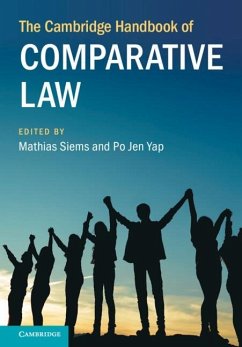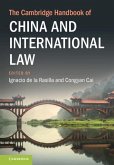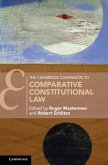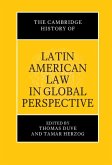Cambridge Handbook of Comparative Law (eBook, ePUB)
Redaktion: Siems, Mathias; Yap, Po Jen
157,95 €
157,95 €
inkl. MwSt.
Sofort per Download lieferbar

79 °P sammeln
157,95 €
Als Download kaufen

157,95 €
inkl. MwSt.
Sofort per Download lieferbar

79 °P sammeln
Jetzt verschenken
Alle Infos zum eBook verschenken
157,95 €
inkl. MwSt.
Sofort per Download lieferbar
Alle Infos zum eBook verschenken

79 °P sammeln
Cambridge Handbook of Comparative Law (eBook, ePUB)
Redaktion: Siems, Mathias; Yap, Po Jen
- Format: ePub
- Merkliste
- Auf die Merkliste
- Bewerten Bewerten
- Teilen
- Produkt teilen
- Produkterinnerung
- Produkterinnerung

Bitte loggen Sie sich zunächst in Ihr Kundenkonto ein oder registrieren Sie sich bei
bücher.de, um das eBook-Abo tolino select nutzen zu können.
Hier können Sie sich einloggen
Hier können Sie sich einloggen
Sie sind bereits eingeloggt. Klicken Sie auf 2. tolino select Abo, um fortzufahren.

Bitte loggen Sie sich zunächst in Ihr Kundenkonto ein oder registrieren Sie sich bei bücher.de, um das eBook-Abo tolino select nutzen zu können.
- Geräte: eReader
- mit Kopierschutz
- eBook Hilfe
- Größe: 18.43MB
- FamilySharing(5)
Andere Kunden interessierten sich auch für
![Cambridge Companion to Comparative Law (eBook, ePUB) Cambridge Companion to Comparative Law (eBook, ePUB)]() Cambridge Companion to Comparative Law (eBook, ePUB)22,95 €
Cambridge Companion to Comparative Law (eBook, ePUB)22,95 €![Cambridge Handbook of China and International Law (eBook, ePUB) Cambridge Handbook of China and International Law (eBook, ePUB)]() Cambridge Handbook of China and International Law (eBook, ePUB)147,95 €
Cambridge Handbook of China and International Law (eBook, ePUB)147,95 €![Cambridge Handbook of Foreign Judges on Domestic Courts (eBook, ePUB) Cambridge Handbook of Foreign Judges on Domestic Courts (eBook, ePUB)]() Cambridge Handbook of Foreign Judges on Domestic Courts (eBook, ePUB)196,95 €
Cambridge Handbook of Foreign Judges on Domestic Courts (eBook, ePUB)196,95 €![Cambridge Handbook of Copyright Limitations and Exceptions (eBook, ePUB) Cambridge Handbook of Copyright Limitations and Exceptions (eBook, ePUB)]() Cambridge Handbook of Copyright Limitations and Exceptions (eBook, ePUB)125,95 €
Cambridge Handbook of Copyright Limitations and Exceptions (eBook, ePUB)125,95 €![Cambridge Companion to Comparative Constitutional Law (eBook, ePUB) Cambridge Companion to Comparative Constitutional Law (eBook, ePUB)]() Cambridge Companion to Comparative Constitutional Law (eBook, ePUB)23,95 €
Cambridge Companion to Comparative Constitutional Law (eBook, ePUB)23,95 €![Cambridge Companion to Comparative Family Law (eBook, ePUB) Cambridge Companion to Comparative Family Law (eBook, ePUB)]() Cambridge Companion to Comparative Family Law (eBook, ePUB)22,95 €
Cambridge Companion to Comparative Family Law (eBook, ePUB)22,95 €![Cambridge History of Latin American Law in Global Perspective (eBook, ePUB) Cambridge History of Latin American Law in Global Perspective (eBook, ePUB)]() Cambridge History of Latin American Law in Global Perspective (eBook, ePUB)118,95 €
Cambridge History of Latin American Law in Global Perspective (eBook, ePUB)118,95 €-
-
-
Produktdetails
- Verlag: Cambridge University Press
- Erscheinungstermin: 31. Januar 2024
- Englisch
- ISBN-13: 9781108906876
- Artikelnr.: 70910756
Dieser Download kann aus rechtlichen Gründen nur mit Rechnungsadresse in A, B, BG, CY, CZ, D, DK, EW, E, FIN, F, GR, HR, H, IRL, I, LT, L, LR, M, NL, PL, P, R, S, SLO, SK ausgeliefert werden.
- Herstellerkennzeichnung Die Herstellerinformationen sind derzeit nicht verfügbar.
1. Introduction: a new handbook for comparative law in a global context Mathias Siems and Po Jen Yap
Part I. Methods of Comparative Law: 2. Traditional methods Jaakko Husa
3. Historical-jurisprudential methods Jean-Louis Halpérin
4. Critical methods Thomas Coendet
5. Culture and comparative law methodology Qian Xiangyang
6. Linguistic approaches ¿ucja Biel
7. Qualitative fieldwork Petra Mahy, Richard Mitchell, John Howe, Ingrid Landau and Carolyn Sutherland
8. New institutional economics Olive Sabiiti
9. Empirical methods Mathias Siems
10. Machine-learning methods Han-wei Ho, Patrick Chung-Chia Huang and Yun-chien Chang
Part II. Legal Families and Geographical Comparisons: 11. Civil law Andrea Ortolani
12. Common law Shivprasad Swaminathan
13. Confucian legal tradition Ngoc Son Bui
14.Former Soviet States of Eastern Europe, Caucasus and Central Asia Andrey Shirvindt
15. Latin America Isabel Zuloaga and José Manuel Díaz de Valdés
16. Middle East and North Africa Radwa Elsaman
17. South Asia Rehan Abeyratne
18. Sub-Saharan Africa Charles Manga Fombad
Part III. Central Themes in Comparative Law: 19. The tradition of comparative law: comparison and its colonial legacies Helge Dedek
20. Decolonial theory and comparative law Roger Merino
21. Legal transplants: a theoretical framework and a case study from public law Margit Cohn
22. Legal transplants: a case study of private law in its historical context Gerardo Caffera, Rodrigo Momberg and María Elisa Morales
23. Convergence and divergence in public law Po Jen Yap
24. Convergence and divergence in company law Hatice Kübra Kandemir
25. Law and development Yong-Shik Lee and Andrew Harding
26. Divided legal systems: understanding legal systems in conflict-prone societies M. Bashir Mobasher and Haroun Rahimi
27. Legal pluralism and commerce Ada Ordor, Nojeem Amodu and Victor Amadi
Part IV. Comparative Law Beyond the State: 28. Comparative international law Danielle Hanna Rached and Conrado Hubner Mendes
29. Transnational regulation Victor V. Ramraj
30. Quantitative forms of legal governance Rene Urueña
31. Comparative international arbitration law Shahla Ali
32. Cross-border judicial dialogue Tom Gerald Daly
33. Comparing regional law Armin Cuyvers
34. Comparative conflict of laws Yuko Nishitani
35. Comparative indigenous law Anthony C. Diala
36. Comparative legal education Tan Cheng-Han, Alan Koh, Topo Santoso, Umakanth Varottil and Jiangyu Wang.
Part I. Methods of Comparative Law: 2. Traditional methods Jaakko Husa
3. Historical-jurisprudential methods Jean-Louis Halpérin
4. Critical methods Thomas Coendet
5. Culture and comparative law methodology Qian Xiangyang
6. Linguistic approaches ¿ucja Biel
7. Qualitative fieldwork Petra Mahy, Richard Mitchell, John Howe, Ingrid Landau and Carolyn Sutherland
8. New institutional economics Olive Sabiiti
9. Empirical methods Mathias Siems
10. Machine-learning methods Han-wei Ho, Patrick Chung-Chia Huang and Yun-chien Chang
Part II. Legal Families and Geographical Comparisons: 11. Civil law Andrea Ortolani
12. Common law Shivprasad Swaminathan
13. Confucian legal tradition Ngoc Son Bui
14.Former Soviet States of Eastern Europe, Caucasus and Central Asia Andrey Shirvindt
15. Latin America Isabel Zuloaga and José Manuel Díaz de Valdés
16. Middle East and North Africa Radwa Elsaman
17. South Asia Rehan Abeyratne
18. Sub-Saharan Africa Charles Manga Fombad
Part III. Central Themes in Comparative Law: 19. The tradition of comparative law: comparison and its colonial legacies Helge Dedek
20. Decolonial theory and comparative law Roger Merino
21. Legal transplants: a theoretical framework and a case study from public law Margit Cohn
22. Legal transplants: a case study of private law in its historical context Gerardo Caffera, Rodrigo Momberg and María Elisa Morales
23. Convergence and divergence in public law Po Jen Yap
24. Convergence and divergence in company law Hatice Kübra Kandemir
25. Law and development Yong-Shik Lee and Andrew Harding
26. Divided legal systems: understanding legal systems in conflict-prone societies M. Bashir Mobasher and Haroun Rahimi
27. Legal pluralism and commerce Ada Ordor, Nojeem Amodu and Victor Amadi
Part IV. Comparative Law Beyond the State: 28. Comparative international law Danielle Hanna Rached and Conrado Hubner Mendes
29. Transnational regulation Victor V. Ramraj
30. Quantitative forms of legal governance Rene Urueña
31. Comparative international arbitration law Shahla Ali
32. Cross-border judicial dialogue Tom Gerald Daly
33. Comparing regional law Armin Cuyvers
34. Comparative conflict of laws Yuko Nishitani
35. Comparative indigenous law Anthony C. Diala
36. Comparative legal education Tan Cheng-Han, Alan Koh, Topo Santoso, Umakanth Varottil and Jiangyu Wang.
1. Introduction: a new handbook for comparative law in a global context Mathias Siems and Po Jen Yap
Part I. Methods of Comparative Law: 2. Traditional methods Jaakko Husa
3. Historical-jurisprudential methods Jean-Louis Halpérin
4. Critical methods Thomas Coendet
5. Culture and comparative law methodology Qian Xiangyang
6. Linguistic approaches ¿ucja Biel
7. Qualitative fieldwork Petra Mahy, Richard Mitchell, John Howe, Ingrid Landau and Carolyn Sutherland
8. New institutional economics Olive Sabiiti
9. Empirical methods Mathias Siems
10. Machine-learning methods Han-wei Ho, Patrick Chung-Chia Huang and Yun-chien Chang
Part II. Legal Families and Geographical Comparisons: 11. Civil law Andrea Ortolani
12. Common law Shivprasad Swaminathan
13. Confucian legal tradition Ngoc Son Bui
14.Former Soviet States of Eastern Europe, Caucasus and Central Asia Andrey Shirvindt
15. Latin America Isabel Zuloaga and José Manuel Díaz de Valdés
16. Middle East and North Africa Radwa Elsaman
17. South Asia Rehan Abeyratne
18. Sub-Saharan Africa Charles Manga Fombad
Part III. Central Themes in Comparative Law: 19. The tradition of comparative law: comparison and its colonial legacies Helge Dedek
20. Decolonial theory and comparative law Roger Merino
21. Legal transplants: a theoretical framework and a case study from public law Margit Cohn
22. Legal transplants: a case study of private law in its historical context Gerardo Caffera, Rodrigo Momberg and María Elisa Morales
23. Convergence and divergence in public law Po Jen Yap
24. Convergence and divergence in company law Hatice Kübra Kandemir
25. Law and development Yong-Shik Lee and Andrew Harding
26. Divided legal systems: understanding legal systems in conflict-prone societies M. Bashir Mobasher and Haroun Rahimi
27. Legal pluralism and commerce Ada Ordor, Nojeem Amodu and Victor Amadi
Part IV. Comparative Law Beyond the State: 28. Comparative international law Danielle Hanna Rached and Conrado Hubner Mendes
29. Transnational regulation Victor V. Ramraj
30. Quantitative forms of legal governance Rene Urueña
31. Comparative international arbitration law Shahla Ali
32. Cross-border judicial dialogue Tom Gerald Daly
33. Comparing regional law Armin Cuyvers
34. Comparative conflict of laws Yuko Nishitani
35. Comparative indigenous law Anthony C. Diala
36. Comparative legal education Tan Cheng-Han, Alan Koh, Topo Santoso, Umakanth Varottil and Jiangyu Wang.
Part I. Methods of Comparative Law: 2. Traditional methods Jaakko Husa
3. Historical-jurisprudential methods Jean-Louis Halpérin
4. Critical methods Thomas Coendet
5. Culture and comparative law methodology Qian Xiangyang
6. Linguistic approaches ¿ucja Biel
7. Qualitative fieldwork Petra Mahy, Richard Mitchell, John Howe, Ingrid Landau and Carolyn Sutherland
8. New institutional economics Olive Sabiiti
9. Empirical methods Mathias Siems
10. Machine-learning methods Han-wei Ho, Patrick Chung-Chia Huang and Yun-chien Chang
Part II. Legal Families and Geographical Comparisons: 11. Civil law Andrea Ortolani
12. Common law Shivprasad Swaminathan
13. Confucian legal tradition Ngoc Son Bui
14.Former Soviet States of Eastern Europe, Caucasus and Central Asia Andrey Shirvindt
15. Latin America Isabel Zuloaga and José Manuel Díaz de Valdés
16. Middle East and North Africa Radwa Elsaman
17. South Asia Rehan Abeyratne
18. Sub-Saharan Africa Charles Manga Fombad
Part III. Central Themes in Comparative Law: 19. The tradition of comparative law: comparison and its colonial legacies Helge Dedek
20. Decolonial theory and comparative law Roger Merino
21. Legal transplants: a theoretical framework and a case study from public law Margit Cohn
22. Legal transplants: a case study of private law in its historical context Gerardo Caffera, Rodrigo Momberg and María Elisa Morales
23. Convergence and divergence in public law Po Jen Yap
24. Convergence and divergence in company law Hatice Kübra Kandemir
25. Law and development Yong-Shik Lee and Andrew Harding
26. Divided legal systems: understanding legal systems in conflict-prone societies M. Bashir Mobasher and Haroun Rahimi
27. Legal pluralism and commerce Ada Ordor, Nojeem Amodu and Victor Amadi
Part IV. Comparative Law Beyond the State: 28. Comparative international law Danielle Hanna Rached and Conrado Hubner Mendes
29. Transnational regulation Victor V. Ramraj
30. Quantitative forms of legal governance Rene Urueña
31. Comparative international arbitration law Shahla Ali
32. Cross-border judicial dialogue Tom Gerald Daly
33. Comparing regional law Armin Cuyvers
34. Comparative conflict of laws Yuko Nishitani
35. Comparative indigenous law Anthony C. Diala
36. Comparative legal education Tan Cheng-Han, Alan Koh, Topo Santoso, Umakanth Varottil and Jiangyu Wang.







